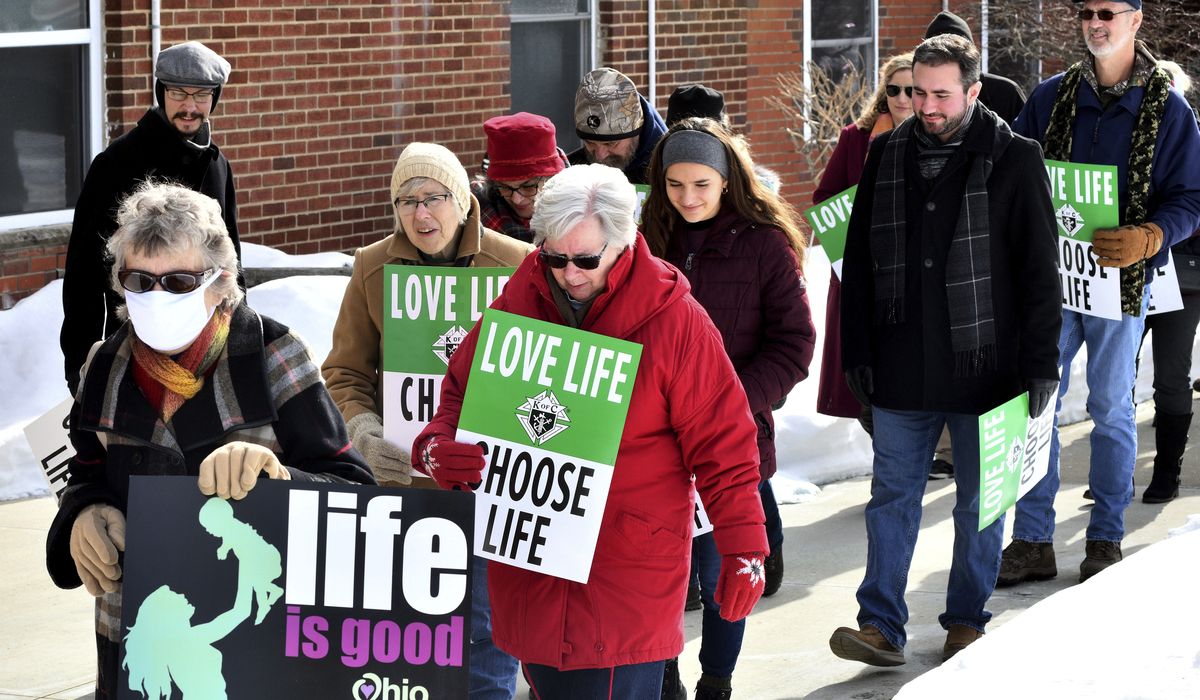
Thousands of pro-life activists returned in person to Washington for the 49th annual March for Life on Friday, braving frigid temperatures to stride proudly to the U.S. Supreme Court with the hope that justices will soon overturn Roe v. Wade.
“Nearly 49 years ago tomorrow — on January 22nd, 1973 — our country was forever changed when seven men on the United States Supreme Court handed down the Roe v. Wade decision, making American history by expanding abortion to all 50 states, and legalizing abortion through all three trimesters, until birth,” said Jeanne Mancini, president of the March for Life. “We are hoping and praying that this year, 2022, will bring a historic change for life.”
The annual event, held virtually last year, was live-streamed on EWTN Global Catholic Network and the March for Life Facebook page.
The theme of this year’s march was “equality begins in the womb.”
“I believe all lives matter,” said Toni McFadden, an activist who was cheered when she told the crowd that her “biggest regret” was having an abortion.
Ms. Mancini introduced 18 pro-life members of Congress onstage at a noon rally on the National Mall, which preceded the march along Constitution Avenue. They included Rep. Chris Smith, New Jersey Republican, and Rep. Julia Letlow, Louisiana Republican.
“We are here to say equality begins in the womb,” Mr. Smith said, adding that the country is at a “tipping point” on the abortion issue.
Medical science now shows that fetuses can “feel pain” at 15 weeks in the womb, he said.
Ms. Letlow, the first Republican woman elected to Congress from Louisiana, echoed this sentiment.
“In the coming months, we anticipate a monumental decision from the Supreme Court,” she said.
Activists in the crowd expressed hope that the Supreme Court’s 6-3 conservative majority will uphold Mississippi’s 15-week abortion ban, which the justices are deliberating in the pending case of Dobbs v. Jackson Women’s Health Organization.
“It’s a crucial march because it could be the last one,” said Veronica Kuenstle, 25, who said she traveled from Scottsdale, Arizona, for her first march in 10 years. “It’s more important than ever to offer a peaceful, loving witness.”
Izzy Robby, a 17-year old senior at St. James Academy in Lenexa, Kansas, said she was happy to attend her first march after last year’s virtual event.
“I’m very happy to finally be here in my senior year,” Ms. Robby said. “I wanted to come last year, but COVID prevented it.”
A group of 200 students said they drove for 21 hours straight from Ave Maria University in Florida to attend this year’s march.
“It’s amazing to be around so many people who want to abolish abortion,” said Mary Soria, a 21-year old sophomore. “Life feels more vital with COVID-19 happening.”
Cold temperatures appeared to limit the crowd at this year’s rally, which barely filled the two blocks on the mall between 12th and 14th streets. Activists and police estimated between several hundred and at least 2,000 attended.
That crowd swelled to several thousand by early afternoon, when former “Growing Pains” sitcom star Kirk Cameron, now an evangelical Christian filmmaker, delivered the keynote address to send the protesters on their way.
“I’m proud to be with you,” Mr. Cameron told the crowd, adding that he believed the marchers followed a “mandate from above” to live justly.
Former Rep. Dan Lipinski, a pro-life Illinois Democrat who served in Congress for 16 years before losing a primary race to a pro-choice Democrat in 2020, said it was more important than ever to reach out to pro-life Democrats to ensure that abortion isn’t a “partisan issue.”
“They came after me because they wanted to silence the voice of pro-life Democrats,” Mr. Lipinski said.
Kristen Day, head of Democrats for Life of America, told The Washington Times it was more urgent than ever to push back on the Biden administration’s drift toward abortion on demand.
“We’re excited to be here today as pro-life Democrats, because the pro-life movement is very optimistic right now,” Ms. Day said.
Although some had predicted only 1,000 would attend this year’s march after last year’s virtual event, Ms. Day said as she gazed down Constitution Avenue that it was very clearly much more than that.
“It doesn’t feel like we missed anything being away for a year,” she said.
The U.S. Park Police no longer provides official crowd estimates, and march organizers also declined on Friday to provide one.
But organizers had estimated a crowd of 50,000 on their National Park Service permit application, less than half of the more than 100,000 who attended the 2020 march that former President Donald Trump addressed.
Several large pro-life groups that usually bring bus caravans from the Midwest, including the University of Notre Dame, canceled their trips this year due to concerns about the omicron variant of COVID-19.
Others reported bringing smaller groups this year, as the District’s strict COVID-19 regulations and new vaccine passport mandate seemed to discourage some protesters.
Many venues that normally put up visiting student groups for free, including The Catholic University of America, also said they could not host anyone this year to COVID-19 restrictions.
Colorado Christian University brought 50 students this year, down from 200 two years ago. But students said they were happy to be back in person regardless of crowd size.
Activists said they felt buoyed by Texas’s six-week abortion ban. On Thursday, the Supreme Court decided by a 6-3 vote not to accelerate legal challenges to the law, with the three liberal justices dissenting.
“It’s more important than ever to be here as witnesses for life,” said Jordan St. Cyr, a 38-year old musician from Canada who performed at the rally.
Mr. St. Cyr added that his three-year-old daughter, a special needs child with a neurological disorder, inspired him to attend his first march this year.
“God has grown our family in ways we never thought possible because of this little girl,” he said.
Correction: A previous version of this story incorrectly reported the name of Colorado Christian University.








